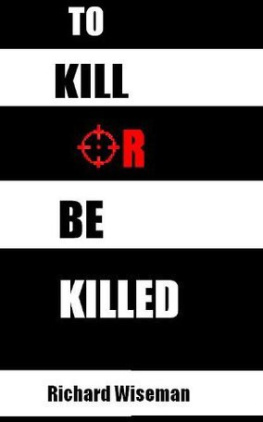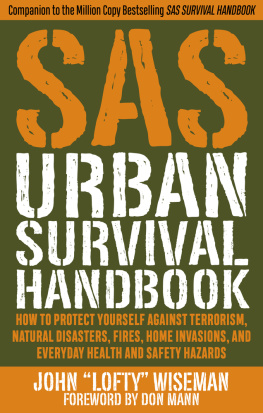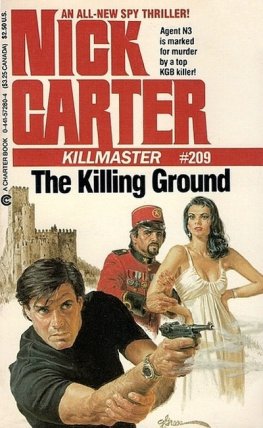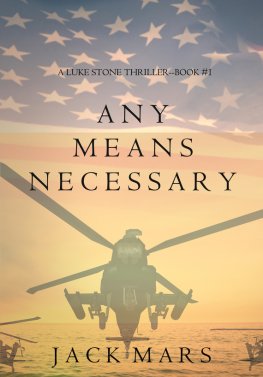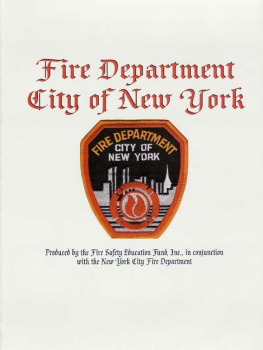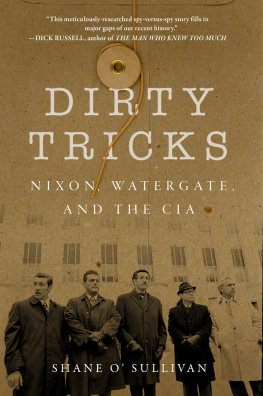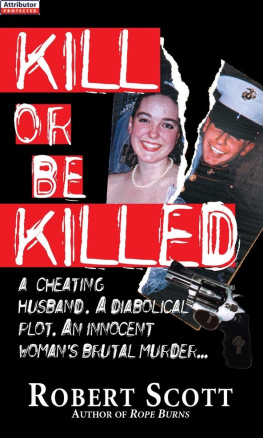TO KILL
OR
BE KILLED
By
Richard Wiseman
Smashwords Edition
Copyright 2009 RichardL Wiseman 2009
This e-book is licensedfor your personal enjoyment only. This e-book may not be resold orgiven away to other people. If you would like to share this bookwith another person, please purchase an additional copy for eachrecipient. If you are reading this book and did not purchase it, orit was not purchased for your use only, then please return toSmashwords .com an purchase your own copy. Thank you for respectingthe hard work of this author.
Prologue
Its a wellknown fact that back in 1940 with the threat of the Nazi invasionof England by Hitler that Winston Churchill organised a resistanceforce. Caches of weapons were built up around the country in hidingplaces and people were organised and trained to fight as the Frenchresistance did after the Nazi invasion. Of course the invasion ofEngland never came and to this day a number of the caches ofexplosives, weapons and equipment still lie buried in parts ofEngland awaiting resistance fighters who will never come and arenot now needed.
It is a littleknown fact that Winston Churchill also created an espionage networkacross the United Kingdom in 1940 to assist the resistance fightersand to watch the government, the law enforcement agencies, thearmy, the navy, the air force, the people of the towns and citiesand generally speaking the streets, the transport routes andcoastline for any attempts to infiltrate the land, the communitiesand the forces organised to protect the country. This agency wasmade up of ordinary citizens, chosen for their loyalty, theirlevels of intelligence and their foresight.
They werescattered across the UK, armed, equipped with the latesttechnology, which at the time was radio and radar equipment, andgiven diplomatic immunity on the British mainland. They were a nonmilitary branch of the civil service. They were recruited on thebasis of recommendation from Churchills most trusted aides. Theywere of course not needed when Hitlers army failed to invade, butthey continued their espionage work through the war.
The police,Special Branch, MI5 and MI6 watch for threats against the UK,domestic and foreign. They have done since Churchills time andbefore, but since 1940 those watchmen and watchwomen of the knownand recognised services have been in turn watched by Churchillswar time secret network.
Its a littleknown fact that the network of watchers set up by Churchill in 1940still exists to this day and there is still a web of men and womenin every town and village across the UK working for a branch of thecivil service known as the Department for Internal Concerns or theDIC. They are the unseen and unknown; they are those who watch thewatchers.
Chapter 1
LOCH CARRONSCOTLAND
JUST BEFORE DAWN
April 17th
The shores ofLoch Carron are beautiful, with ragged edges of rock against whichchilly sea water sometimes bumps gently and incessantly and atother times scrapes and scratches wildly, rasping away at thegouges time and tide have left on the lands edge. Deep green mossand grass cover the bumpy ground of the foreshore like crumpledbaize and there is a reinvigorating power in the clean and Spartanair.
One might walkhappily, if a little cold, on spring days, over rough chunky tracksto the edge of the Atlantic Ocean and, on a clear day, see to thestark western horizon. Night is different though. You have to be ofa mind as sturdy as the clothes and boots youll need and as clearin your mind about your business as the thick plastic lens on thekind of heavy duty torch youll need to cut the pure darkness ofsuch a landscape.
A skilledcaptain with a good crew and some nerve could bring a submarinefrom the Atlantic into the inner sound and within a strongswimmers distance of the shores close to Port an-eorna. It wouldhave to be a powerful swimmer with emotions as cold as the water,not to mention good modern diving gear, to even attempt such afeat. It was in fact five such cold fish who left the submarine,gathered together in the water, orientated themselves by compassbearing and headed for the shores of Scotland with carefuleffort.
The submarineturned about, job done, and dropped out of sight. The captain, notfor the first time thinking that his vessel and specialist teamswilling to swim a decent sized distance were easily the best way tomake an incursion into enemy territory unsighted and unnoticed. Onthis occasion he was wrong; his vessel had caused a blip and ableep on some highly sensitive equipment located in the loft of ahouse just off Main Street Drumbuie. He wasnt to have known it wasthere, neither were the five swimmers; nor did, amazingly, thepeople of the area or the neighbours of the man who lived in thathouse know anything other than that Michael Dewey was a computerprogramme writer and that the slightly bigger than usual whitesatellite dish on the house was for the purpose of transmitting andreceiving the work he did to allow him to live in such a remote andbeautiful place in easy comfort.
Inside his lofta small sized, but commensurately powerful radar scanner rotatedslowly and an electronic screen registered vessels tracking themacross the LCD map. All of this information was fed into a laptopwhich in turn was linked to a satellite phone.
Michael was anearly riser and was sipping tea waiting for the dawn, which was amere half hour away, when his idle scanning in the loft registeredthe submarine. He climbed down the loft ladder and frowned at thedrizzle spattered glass of the landing window. April was living upto its reputation.
He made a shortvisit to the gun cabinet in his bedroom to remove a well oiledautomatic Sig 220 pistol. A quick check on the mechanism reassuredhim of his ability to defend himself and he slipped it into a beltholster.
In the halldownstairs he laced on his walking boots and put on a heavy waxedgreen coat. At the sight of the coat and boots Paddy, his Bordercollie, jumped around him wagging his tail. Paddy didnt bark,knowing his master didnt approve of unnecessary sound. FinallyDewey grabbed his night vision binoculars, hanging in a case in thehall, and together he and Paddy went out into the drizzly darknessand climbed into the Land Rover.
The Land Roverleft Drumbuie and a short time later it was bumping over the tracksto the waters edge. As the Land Rover was approaching the landsedge the five swimmers from the submarine were approaching a slightrocky cove which was half mile to the left of Deweys aimed forvantage point.
There were afew bubbles and some turbulence in the harshly cold Atlantic water,but amongst the daily thrash of the ocean it was for the best partinvisible. The swimmers closed up on the land and one by one hauledeach other onto the rocks. As the first two landed waterproof bagswere handed up and activity began silently. The five men, for menthey were, took no break after the long hard slog through the coldwaves. They stripped in the near dawn darkness, changed into dryclothes by touch, stowed equipment, readied themselves and sanktheir water gear and all signs of their landing into the dark waternear the rocks.
Out of the carwith his master Paddy sniffed around the moss and grass happilyletting the light wind brush his black and white fur. Michaelsnight vision binoculars inched their way over the seascape. He sawnothing, but still he scanned and watched.
The men on therocks had crawled with care from sea level to land level and werenow dressed in civilian clothing. Keeping a careful look out,watching to right and left, one after another they made their wayinland. The first to the A87 road to thumb a lift, the second tothe Plockton air strip, the third to the rail station at Duirnish,the fourth to a waiting motorbike in Drumbuie and the last to thePlockton harbour, where a boat was waiting.

